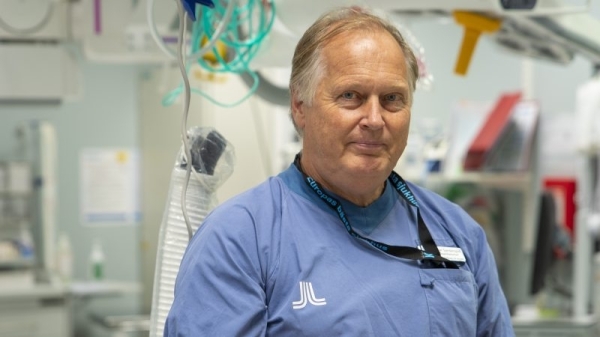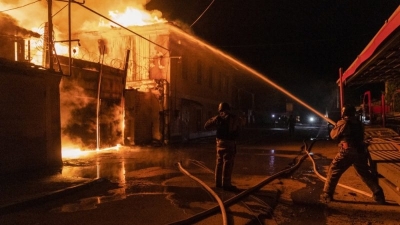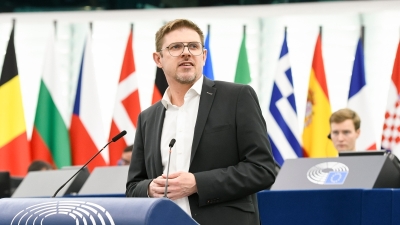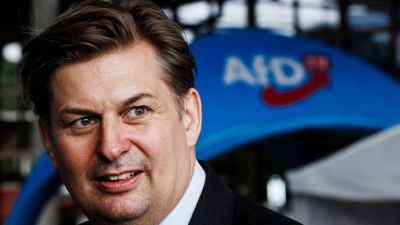Swedish doctors push medical limits to save Ukrainian soldiers’ limbs

Ukrainian soldiers evacuated to Sweden often face amputation as a result of trauma from artillery shells and mines, but Swedish doctors are going the extra mile to save and restore the function of patients’ limbs. Deep infections and long-term isolation remain challenges for recovery.
Swedish doctors get a glimpse of the horrors of Russia’s full-scale war on Ukraine when they meet newly arrived wounded Ukrainian soldiers almost every week at the Karolinska University Hospital near Stockholm. It is the Swedish hospital that has treated most of the soldiers needing specialist care since the war began.
This war has also turned the doctors’ assumptions on their heads, Gunnar Sandersjöö, a trauma surgeon who heads the Karolinska University Hospital’s huge trauma unit, tells Euractiv in an interview.
“This is because we almost never see any battle-related gunshot wounds anymore. What we mostly see are severe blast injuries from artillery shells and mines, which often affect the extremities and require intensive surgery. This also means that we spend a lot of time trying to reconstruct arms and legs,” he explains.
A European operation
Since March 2022, Sweden and 21 other European countries are participating in the largest medical evacuation operation coordinated to date by the EU Commission’s Emergency and Response Coordination Centre.
According to the centre, more than 3,000 patients have now been transferred from war-torn Ukraine to other European countries. And Norway stands out, as it has taken many Ukrainian patients, more than double the amount compared to Sweden.
Norway has also provided regular weekly flights to evacuate patients to countries across Europe. As of early February, it had evacuated 1,538 patients with the help of the Norwegian Armed Forces Joint Medical Service. These transports are described by the EU Commission as a cornerstone of the medical evacuation effort. The evacuations are also further supported by the EU Medevac Hub in Rzeszów, Poland, where patients are cared for 24 hours a day.
So far, Sweden has received 154 patients. About 85 of them have been treated at Karolinska Hospital, which received its first two Ukrainian patients in March 2022. The others have been treated at hospitals in other major Swedish cities. About half of the patients were soldiers, and half were patients with serious cancers.
Soldiers in Ukraine are first taken care of in the country, while the 45 soldiers that have been transferred to Karolinska have had injuries that occurred 3-6 months ago, according to Gunnar Sandersjöö.
Infections, an additional foe
In addition, many soldiers often have deep infections caused by multi-resistant bacteria when they arrive in Sweden, which requires special clinical skills and treatment, Sandersjöö points out.
“Some of the strains of bacteria we found in the wounds were actually resistant to all antibiotics, so you have to do the same as in cancer surgery. You have to cut away the diseased tissue and bone fragments with a good margin”, he says.
At the same time, many soldiers have injuries on their arms and legs due to intensive artillery shelling and mines. But the doctors at the Karolinska have so far been able to help most of their Ukrainian patients to actually avoid amputation, according to Sandersjöö.
“We have only had to amputate in a very few cases,” he explains.
To save a leg or an arm, he and his colleagues are using established methods such as bone transport and lengthening. But to be successful, they sometimes need to work at the limit of what they thought was medically possible, says Gunnar Sandersjöö.
According to him, doctors can lengthen a bone segment by one millimetre a day until it has the right length, direction and rotation, which will take around three to six months.
Rehabilitation
During rehabilitation, the patients are given a place to live outside the hospital by the Swedish Migration Agency.
But being a patient away from home and in a foreign country can be lonely.
“If I could wish something for my patients, it would be that we could arrange for them to be less isolated. That would also help them to get better and heal”, Gunnar Sandersjöö says.
His trauma unit would certainly like to be able to help more Ukrainian patients, but that would be difficult to manage as Swedish trauma and orthopaedic surgeons already are squeezing the war-torn patients into gaps in their operation schedules.
“Swedish care is lagging after the pandemic and has poor funding. I suspect that it is the same situation in many hospitals in Europe, [where staff] are also working full-time, as we are,” he said.
[By Monica Kleja, edited by Vasiliki Angouridi, Brian Maguire | Euractiv’s Advocacy Lab]
Read more with Euractiv




